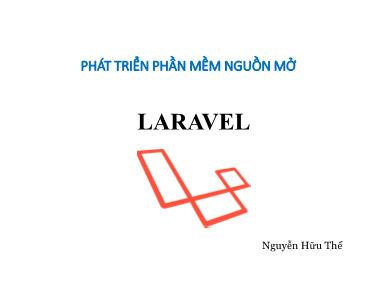Bài giảng Phát triển phần mềm nguồn mở - Chương 5: Laravel - Nguyễn Hữu Thể
Laravel
− A powerful MVC PHP framework
− Designed for developers who need a simple and
elegant toolkit to create full-featured web
applications.
− Laravel was created by Taylor Otwell.
Laravel
− Laravel is a MVC framework.
• Incorporates many of the best features of frameworks like
CodeIgniter, Yii, ASP.NET MVC, Ruby on Rails, Sinatra,
and others.
− Laravel is an Open Source framework.
• It has a very rich set of features which will boost the speed
of Web Development.
Laravel – Features
− Modularity
− Testability
− Routing
− Configuration management
− Query builder and ORM (Object Relational Mapper)
− Schema builder, migrations, and seeding
− Template engine
− E-mailing
− Authentication
− Redis
− Queues
− Event and command bus
Bạn đang xem tài liệu "Bài giảng Phát triển phần mềm nguồn mở - Chương 5: Laravel - Nguyễn Hữu Thể", để tải tài liệu gốc về máy hãy click vào nút Download ở trên
Tóm tắt nội dung tài liệu: Bài giảng Phát triển phần mềm nguồn mở - Chương 5: Laravel - Nguyễn Hữu Thể

LARAVEL Nguyễn Hữu Thể PHÁT TRIỂN PHẦN MỀM NGUỒN MỞ Laravel − A powerful MVC PHP framework − Designed for developers who need a simple and elegant toolkit to create full-featured web applications. − Laravel was created by Taylor Otwell. 2 Laravel − Laravel is a MVC framework. • Incorporates many of the best features of frameworks like CodeIgniter, Yii, ASP.NET MVC, Ruby on Rails, Sinatra, and others. − Laravel is an Open Source framework. • It has a very rich set of features which will boost the speed of Web Development. 3 Laravel – Features − Modularity − Testability − Routing − Configuration management − Query builder and ORM (Object Relational Mapper) − Schema builder, migrations, and seeding − Template engine − E-mailing − Authentication − Redis − Queues − Event and command bus 4 Laravel – Version 5 Version Release date PHP version 1.0 June 2011 2.0 September 2011 3.0 February 22, 2012 3.1 March 27, 2012 3.2 May 22, 2012 4.0 May 28, 2013 ≥ 5.3.0 4.1 December 12, 2013 ≥ 5.3.0 4.2 June 1, 2014 ≥ 5.4.0 5.0 February 4, 2015 ≥ 5.4.0 5.1 LTS June 9, 2015 ≥ 5.5.9 5.2 December 21, 2015 ≥ 5.5.9 5.3 August 23, 2016 ≥ 5.6.4 5.4 January 24, 2017 ≥ 5.6.4 5.5 LTS August 30, 2017 ≥ 7.0.0 5.6 February 7, 2018 ≥ 7.1.3 5.7 September 4, 2018 ≥ 7.1.3 Laravel – Installation − Server Requirements • PHP >= 5.6.4 • OpenSSL PHP Extension • PDO PHP Extension • Mbstring PHP Extension • Tokenizer PHP Extension • XML PHP Extension 6 Laravel - Installation − Step 1 − Visit the following URL and download composer to install it on your system. − https://getcomposer.org/download/ − Step 2 − After the Composer is installed, check the installation by typing the Composer command in the command prompt as shown in the following screenshot. 7 Laravel - Installation − Step 3 − Move to path where you have created the new directory and type the following command there to install Laravel. composer create-project --prefer-dist laravel/laravel MyProject Successfully: 8 Laravel - Installation − Step 4 − Open URL in the browser Or 9 Configuration − Public Directory • Web server's document / web root to be the public directory. • The index.php in this directory serves as the front controller for all HTTP requests entering your application. − Configuration Files • All of the configuration files for the Laravel framework are stored in the config directory. − Directory Permissions • Directories within the storage and the bootstrap/cache directories should be writable by your web server or Laravel will not run. 10 Configuration − Application Key • Set your application key to a random string. • If you installed Laravel via Composer or the Laravel installer, this key has already been set for you by the php artisan key: generate command. • Typically, this string should be 32 characters long. • The key can be set in the .env environment file. • Renamed the .env.example file to .env • If the application key is not set, your user sessions and other encrypted data will not be secure! 11 Configuration − Additional Configuration • Timezone and locale • Cache • Database • Session − Configure your local environment: https://laravel.com/docs/5.3/configuration#environment-configuration 12 Application structure − The default Laravel application structure is intended to provide a great starting point for both large and small applications. − You are free to organize your application however you like. − Laravel imposes almost no restrictions on where any given class is located - as long as Composer can autoload the class. 13 Root Directory − app − the core code of the application. − bootstrap − the application bootstrapping script. − config − configuration files of application. − database − your database migration and seeds. − public − The application’s document root. It starts the Laravel application. JavaScript, CSS, Images,... − resources − raw assets such as the LESS & Sass files, localization and language files. − routes - all of the route definitions for your application. By default, three route files are included with Laravel: web.php, api.php, and console.php. − storage − App storage, like file uploads... Framework storage (cache), and application-generated logs. − test − various test cases. − vendor − composer dependencies. 14 App Directory − Console − All the artisan commands are stored in this directory. − Exceptions − Contains your application's exception handler. − Http − Contains your controllers, filters, and requests. − Providers − Contains various service providers. 15
File đính kèm:
 bai_giang_phat_trien_phan_mem_nguon_mo_chuong_5_laravel_nguy.pdf
bai_giang_phat_trien_phan_mem_nguon_mo_chuong_5_laravel_nguy.pdf

